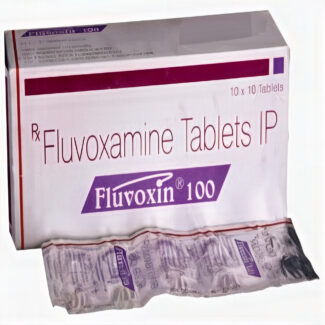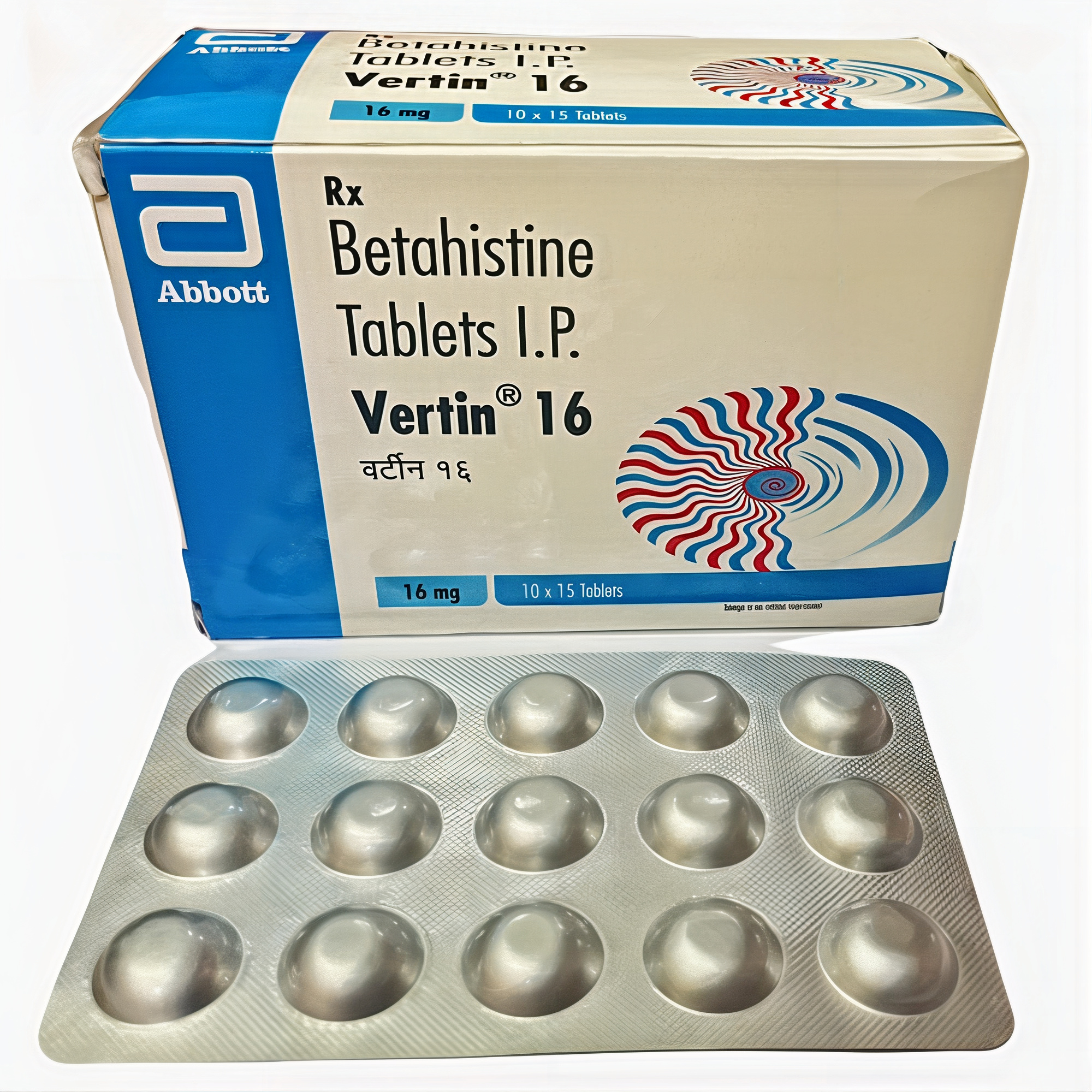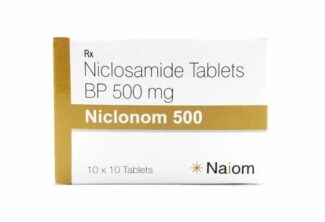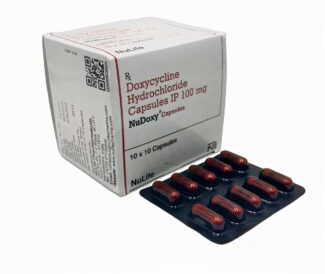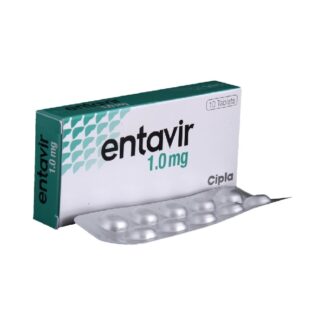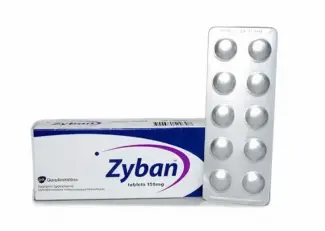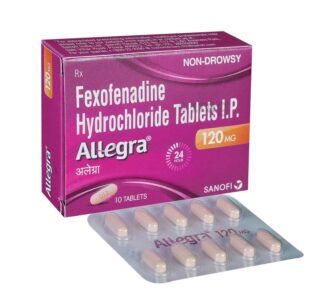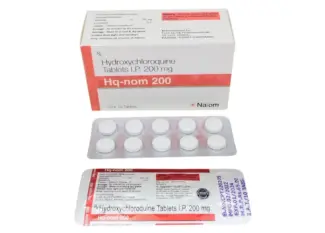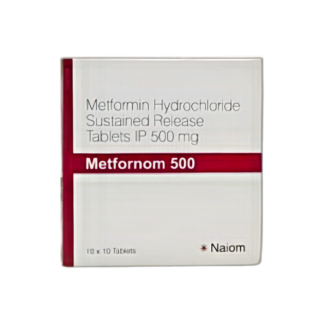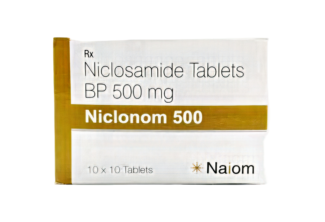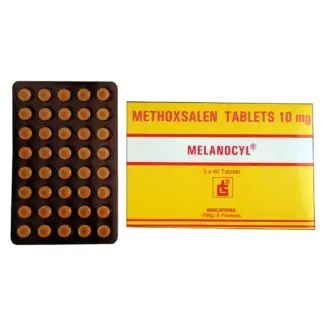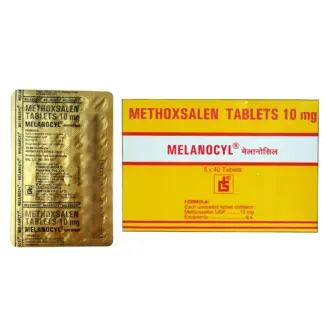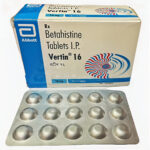Vertin 16 Tablet (Betahistine 16mg)
Vertin 16 Tablet (Betahistine 16mg) is specifically designed to address and mitigate the symptoms of Ménière’s disease, a disorder of the inner ear associated with dizziness (vertigo), ringing in the ears (tinnitus), and hearing loss, likely due to fluid buildup. This medication functions by reducing the amount of fluid, thereby alleviating these distressing symptoms. Consistent use as prescribed by your doctor can significantly improve your quality of life.
Uses Of Vertin 16 Tablet (Betahistine 16mg)
- Treatment of Ménière’s disease
- Reduction of dizziness and vertigo
- Alleviation of tinnitus
- Improvement in hearing loss associated with inner ear fluid
- Enhancement of overall ear function
Treatment of Ménière’s disease: Vertin 16 Tablet (Betahistine 16mg) is used primarily for individuals suffering from Ménière’s disease. It targets the underlying fluid imbalance in the inner ear, which is thought to cause the symptoms.
Reduction of dizziness and vertigo: This medication effectively reduces the dizzy spells and spinning sensations often experienced by individuals with inner ear disorders by improving blood flow.
Alleviation of tinnitus: Persistent ringing in the ears can be mitigated significantly with Vertin 16 Tablet (Betahistine 16mg), providing a better auditory experience for the user.
Improvement in hearing loss associated with inner ear fluid: By managing the fluid levels within the ear, this medication assists in reducing hearing loss, a common symptom of Ménière’s disease.
Enhancement of overall ear function: Regular use of Vertin 16 Tablet (Betahistine 16mg) can help maintain optimal ear functionality, improving the patient’s balance and hearing capacities.
Safety & Precautions
- Consult your doctor if you have a history of stomach ulcers or gastrointestinal issues.
- Inform your doctor if you have asthma or other respiratory conditions.
- Avoid taking this medication if you have high or low blood pressure without medical advice.
- Discuss with your doctor any other medications you are currently taking to avoid interactions.
- Not recommended for use during pregnancy without medical supervision.
- May be unsafe for use during breastfeeding; consult your healthcare provider.
- Should be taken at the same time daily for consistent effectiveness.
- Do not chew or crush the tablet; swallow it whole.
- Can be taken with or without food, but taking it with food may reduce stomach upset.
- Consult your doctor if you experience persistent side effects or if they worsen.
Side Effects
Most side effects do not require any medical attention and disappear as your body adjusts to the medicine. Consult your doctor if they persist or if you’re worried about them.
- Headache
- Indigestion
- Nausea
- Stomach pain
- Bloating
- Gastric discomfort
- Hives (in rare cases)
- Uncommon allergic reactions
- Rash
- Severe dizziness
- Difficulty breathing (consult doctor immediately)
- Fatigue
- Anxiety
- Abdominal cramps
- Vomiting
FAQ
1. How long does it take for Vertin 16 Tablet (Betahistine 16mg) to work?
Vertin 16 Tablet (Betahistine 16mg) typically begins to show improvement in symptoms within a few weeks of regular use. However, for optimal benefits and long-term relief, it may need to be taken for several months as prescribed by your doctor. Even if you feel better, continue taking it until your doctor suggests it’s safe to stop.
2. Can I take Vertin 16 Tablet (Betahistine 16mg) with other medications?
Before starting Vertin 16 Tablet (Betahistine 16mg), ensure you inform your doctor about any other medications you are currently taking. Certain medications may interact with betahistine, potentially reducing its effectiveness or increasing the risk of side effects. Your doctor can provide guidance on safe usage.
3. Is Vertin 16 Tablet (Betahistine 16mg) safe during pregnancy?
Vertin 16 Tablet (Betahistine 16mg) may not be safe during pregnancy, as there are limited studies in humans and potential risks to the developing baby. Your doctor will weigh the benefits and potential risks before prescribing it to you. Always consult your healthcare provider if you are pregnant or planning to become pregnant before taking this medication.
4. Can I consume alcohol while taking Vertin 16 Tablet (Betahistine 16mg)?
Consuming alcohol while taking Vertin 16 Tablet (Betahistine 16mg) does not typically cause harmful side effects. However, it’s always best to practice moderation and consult your doctor if you have concerns about alcohol interactions with your medication.
5. What should I do if I miss a dose of Vertin 16 Tablet (Betahistine 16mg)?
If you miss a dose of Vertin 16 Tablet (Betahistine 16mg), take it as soon as you remember. If it is nearly time for your next dose, skip the missed dose and continue with your regular dosing schedule. Do not take a double dose to make up for the missed one.
6. Can I drive while taking Vertin 16 Tablet (Betahistine 16mg)?
Vertin 16 Tablet (Betahistine 16mg) does not usually affect your ability to drive. However, if you experience dizziness or any other side effects that could impair your driving skills, it’s best to avoid driving and consult your doctor for further advice.
Additional Information
Mechanism of Action: How Does Betahistine Work?
The exact mechanism by which betahistine exerts its therapeutic effects in treating Meniere’s disease remains a topic of research and speculation among experts. However, some hypotheses have been put forward.
- Betahistine is known to be a potent histamine-3 (H3) receptor antagonist.
- Blocking H3 receptors may increase the release of histamine.
- Histamine receptors potentially regulate nerve function in the inner ear, which might explain betahistine’s effects on vertigo and other symptoms associated with Meniere’s disease.
- Contradictory theories exist, and the exact neurochemical pathways remain elusive.
Clinical Trials and Research Studies
Clinical trials investigating the effectiveness of betahistine have yielded mixed results. Design flaws in many studies have made it challenging to draw definitive conclusions.
| Study | Year | Outcome |
|---|---|---|
| Motamed et al. | 2017 | Betahistine was found to be superior to promethazine for treating acute peripheral vertigo. |
| Various Studies | 1960s | Early studies led to the approval of betahistine in the U.S., but the approval was later withdrawn due to insufficient evidence of efficacy. |
Availability in Different Regions
Betahistine’s availability varies across different countries. Here’s an overview of its approved status:
- United States: Not approved. Previously approved in the 1960s but later withdrawn. Can be obtained through compounding pharmacies with a prescription, but insurance coverage is unlikely.
- United Kingdom: Approved and one of the most commonly prescribed medications for Meniere’s disease.
- Various other countries: Available under different brand names, reflecting its global reach despite varying regulatory stances.
Global Brands and Availability
Betahistine is available under numerous brand names worldwide. Below is a table summarizing some of these brands and their distribution regions:
| Brand Name | Country/Region |
|---|---|
| Serc | UK, Australia, New Zealand |
| ACT Betahistine | Canada |
| Betahistine | Belgium, Malta, Netherlands |
| Be-Stedy | Oman |
| Betaserc | Argentina, Colombia, Greece, Hong Kong, Italy, Thailand, Singapore, Switzerland |
| Balanse | India |
| Cyathus/Cyathus Exquirere | Bulgaria, Lithuania, Poland, Romania, Slovakia |
| Histine | Egypt |
| Novertin | Paraguay |
| Vertin 16 Tablet Betahistine (16mg) | India, Turkey |
Insurance and Cost
In the United States, betahistine is not covered by most insurance plans since it is not officially approved by the Food and Drug Administration (FDA).
- Betahistine can be obtained through compounding pharmacies at an estimated cost of around $50 per month.
- The price may vary depending on the specific pharmacy and the formulation of the compound.
Support Groups and Community
For individuals suffering from conditions like Meniere’s disease or vertigo, support groups can provide invaluable assistance and community. Here are some support groups related to betahistine and its treated conditions:
| Support Group | Description |
|---|---|
| Vertigo Support Group | 153 questions, 413 members |
| Meniere’s Disease Support Group | 6 questions, 38 members |
| Ear Conditions Support Group | 2 questions, 8 members |
Resources and References
For further reading and information, consider reviewing the following resources:
- About Betahistine (Serc): NHS. NHS Website
- Meniere’s Disease: Mayo Clinic. Mayo Clinic Website
- Motamed H. et al. (2017). A Comparison of the Effects and Side Effects of Oral Betahistine with Injectable Promethazine in the Treatment of Acute Peripheral Vertigo in Emergency. Journal of Clinical Medicine Research, 9(12), 994–997. Journal Link
- Hain T. Serc (Betahistine). Dizziness and Balance Website
Additional support can be accessed via online communities and forums dedicated to specific conditions affected by betahistine, including vertigo and Meniere’s disease.


